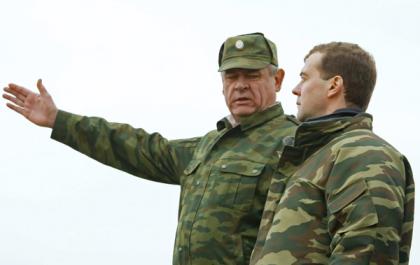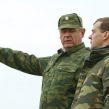
The Latest Reshuffle in the Russian Military
Publication: Eurasia Daily Monitor Volume: 7 Issue: 11
By:

On January 13 the Russian defense ministry confirmed important changes within the military leadership (Interfax, January 12; www.mil.ru, January 13). According to an official account, the Commander-in-Chief of the Russian Ground Forces Army-General Vladimir Boldyrev and the Commander of the North Caucasus Military District Colonel-General Sergey Makarov, along with some other high-ranking generals, were fired.
On January 12, the Russian newspaper Komsomolskaya Pravda, which was the first to publicize the issue from “anonymous sources” within the Russian defense ministry, stated that the official reason for firing the generals was that they “had reached the age limit” for military service (Komsomolskaya Pravda, January 12). On January 13, a more detailed analysis expressed doubts that age was the primary factor in firing Boldyrev, 61, and Makarov, 57. Instead, it was noted that both men “had taken part in the military conflict with Georgia in August 2008” (www.lenta.ru, January 13).
To further strengthen the argument regarding “a Georgia link,” in the latest reshuffle within the Russian military command, Komsomolskaya Pravda speculated that the 54-year-old Commander of the 58th Army Lieutenant-General Anatoly Khrulyov (who also participated in the Russian invasion of Georgia and was wounded by Georgian troops in the vicinity of the Georgian city of Tskhinvali on August 9, 2008) might also be sacked by the Russian leadership (Komsomolskaya Pravda, January 12).
General Boldyrev, who became commander-in-chief of the Russian Ground Forces on August 1, 2008, six days before Russia started its military assault on Georgia, was replaced by Colonel-General Alexander Postnikov, 51, and Lieutenant-General Alexander Galkin, 51, will command the North Caucasus Military District. It remains to be seen whether Khrulyov will indeed be replaced. After the war against Georgia, both Boldyrev and Makarov received the highest military award of the Russian Federation –the Order of Saint George.
Nevertheless, it is unclear what actually triggered the latest wave of change in the Russian military leadership, which will allegedly have broader ramifications in the near future both vertically and horizontally in Russia’s military chain of command, or whether or not the Russian political leadership’s comprehensive evaluation of the Russia-Georgia war and the conduct of the military are linked to the reshuffle. On January 14, Interfax offered several possible explanations for this development (Interfax, January 14). The Russian Defense Minister Anatoliy Serdyukov’s desire to reform the army and replace commanders appointed by his predecessor, or the failure of the defense ministry “to meet its obligation before the state budget” to raise around 10 billion rubles ($339.53 million) “from the realization of military assets” are equally plausible. Interfax also suggested that corruption within the defense ministry had justified Serdyukov’s decision to fire senior military commanders, and based on information provided by “an anonymous source” in the ministry, Serdyukov recently ordered a “massive inspection” in central and district headquarters of the Russian military “to reveal the facts of corruption.”
The Russian internet publication, The Moscow Post, described sacking these senior generals as a “purge of the cadres,” and pointed to rumors long spread throughout the Russian army that “the sacked generals were not happy with the reform” perpetrated by the defense minister (The Moscow Post, January 14). Indeed, some Russian experts explain the dismissals in relation to “the incompetence of the defense minister” (www.gazeta.ru, January 13).
Serdyukov was appointed as defense minister in February 2007, and has intensified his efforts to reform the Russian armed forces in the aftermath of the Russia-Georgia war in August 2008. Allegedly, the overall poor performance of the Russian military during the war and the subsequent occupation of parts of Georgian territory compelled Moscow to undertake the modernization of both military personnel and hardware. Corruption in the army was a major concern, while poor inter-operability, communication and other important parameters of Russian military units were considered to be weaknesses.
The Russian journalist Yulia Latinina told her audience on Echo Moscow radio on January 16 that according to information she had received from “various military attachés,” the Russian ground forces’ poor preparedness and dismal performance during the invasion of Georgia was the primary reason as to why “[the Georgian capital] Tbilisi could not be captured” by the Russians in August 2008 (Ekho Moskvy, January 16).
Also, Russian and international human rights organizations have constantly voiced concern about widespread hazing and violence in Russian military barracks, including those units of the 58th Army commanded by Khrulyov. Interestingly, three Russian soldiers have already deserted to the Georgian side since the beginning of the Russian military occupation, seeking political asylum from Tbilisi (Rustavi-2 TV, December 21, 2009). As reported by Georgian and Russian media, all three alleged that “inhuman conditions” and “hazing” forced them to desert their army units (Rustavi-2 TV, December 21; Russian news agency Regnum, December 22).




